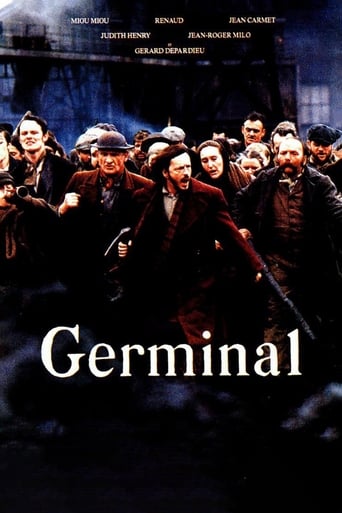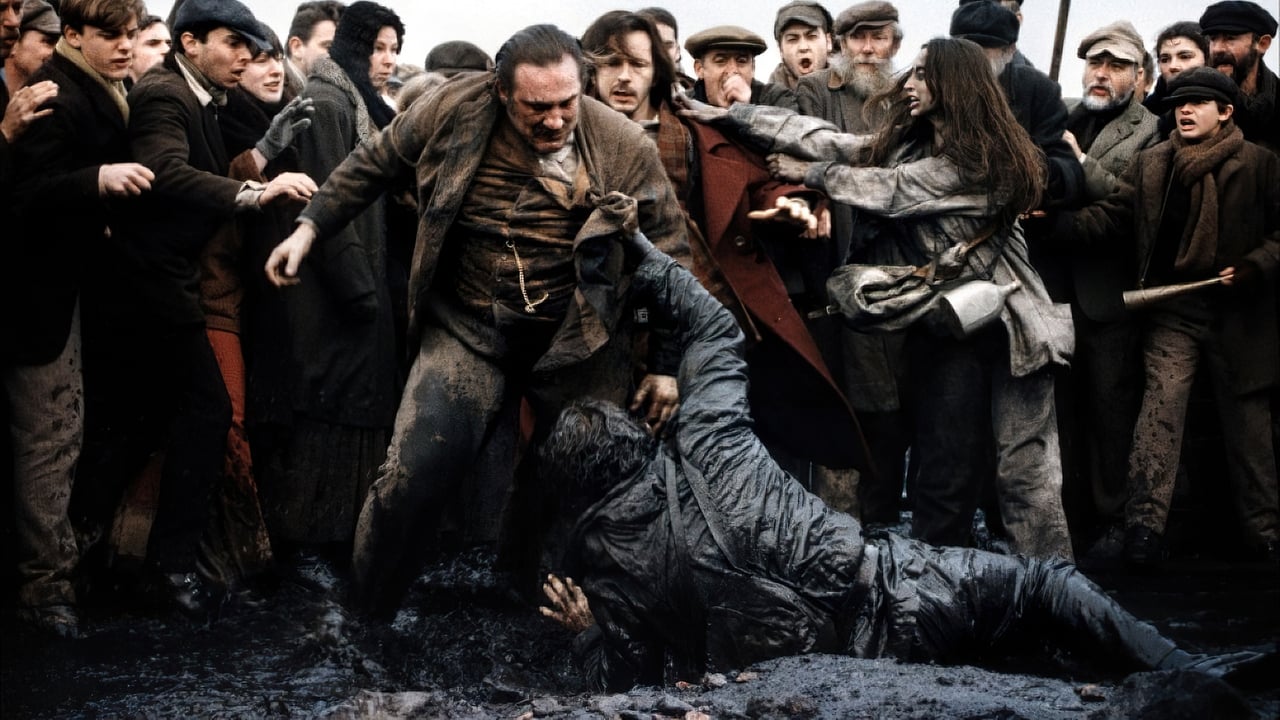gavin6942
In mid-nineteenth-century northern France, a coal mining town's workers are exploited by the mine's owner. One day, they decide to go on strike, and the authorities repress them.First, my confession: I have not read "Germinal". I've thought about it, but among all the great works of literature, it never quite made it to the top of the list. That being said, from what I hear, this film follows the story rather close.What strikes me is how much "smut" the film has. At least in the first half. I find it hard to imagine such things being in the novel, but rural men forcing themselves on rural women in France seems oddly normal. I guess my opinion of France is pretty strange.
Emil Bakkum
Germinal is a film about the workers of a mining company in the North of France, during the seventies of the nineteenth century. it was the time of the First Socialist International, and the rise of the workers movement. The story is based on the book by Emile Zola, with the same title. Although Zola was not a socialist, he sketches a debunking image of the misery and poverty of the common people. I bought the DVD on a visit in Brussels, the bilingual capital of Belgium. Surprisingly the Frenchspeaking minority hardly masters the Dutch language, and this is reflected in the DVD, that lacks any subtitles (not even English ones). Being a Dutchman, my French is rather poor, so it would be unjustified for me to comment on the dialogs. However, the pictures and now and then an understandable passage are clear enough to convey the developments. The mining company operates still in the old tradition, with a true capitalist entrepreneur and owner. The mine is dangerous, and the economic crisis forces the wages to ever lower levels. The miners of both sexes are primitive folks, and we know from contemporary reports that the harsh conditions greatly contributed to their dissoluteness (which of course is less their fault than that of the then employers and system). Naturally they become rebellious, and start a strike fund. A roaming socialist agitator arrives, and becomes engaged in the mining company. When the wages are once again lowered, the miners go on strike. Their financial resistance is low (unions were scarce, and strikes were usually started impulsively), and soon hunger and distress break the workers solidarity. Some of them resume their work, which escalates the situation. The rage of the miners and the revolutionary agitation mix into an explosive atmosphere. The strikers assault the mine, make havoc, and lynch the local storekeeper (who is even castrated by the mob). Now the army is called in to occupy the mine, and protects the non-strikers. When the strikers start to throw stones at the soldiers, they fire into the crowd killing tens of people. For the moment the order is restored, and work is resumed. The ordeal continues, when a bore penetrates the galleries and causes explosions in the installations. Again lots of people are killed. The film follows one particular mining family, who is approximately decimated during the unfolding course of things. Finally the grandfather strangles a daughter of the mine-owner, who visits their house in order to bring relief. Indeed the contrast between the miners' misery and the capitalists' abundance could hardly be more profound. In spite of the at times shocking violence used by the miners, one has to sympathize with them. It was the period of forced capital accumulation, in which the wealthy people were obsessed by economic growth due to capital investments and in the process destroyed the level of consumption and well-being of the people. This film is a good reminder, even without understandable dialogs.
dbdumonteil
Prior to this most recent cover of Emile Zola's novel by Claude Berri, they were various renderings on the silver screen before. A silent version was shot in 1913 and remains difficult to watch. In 1962, Yves Allégret's version of Zola's sprawling novel followed very closely the thread of the storytelling which came to the front while the descriptions of the working-classes and the upper classes took a back seat. 30 years later, Berri got down to a new transposition of the novel to the screen to locate her in the vein of French heritage. Developed by the Mitterrand government, this trend spawned films which were meant to be a popular quality cinema facing American blockbusters and to show French culture in literature at key-moments in French history. This movement was at its peak at the dusk of the eighties and the dawn of the nineties with "Jean De Florette", "Manon Des Sources" (1986), "Cyrano De Bergerac" (1990) or "Madame Bovary" (1991). Generally, these films were financially profitable but weren't up to scratch from an artistic perspective. "Germinal" belongs to this category. Probably the most famous installment in the Rougon-Macquart saga, "Germinal" is also one of the most potent French novels ever written. It was a perilous task to transpose it to the screen and Berri partially did well his job. His film follows very closely the staple framework of the novel and only keeps its main installments including some grisly ones (the sequence of the castration). Hence a simplified and watered-down version in which certain moments are clumsily linked up. Overrall, Berri's piece of work joins the list of films derived from novels in which to be as faithful as possible to the basic work can hamper the artistic potential of the film.Before being a filmmaker or an actor, Berri is especially labeled as a producer and for "Germinal" which was partly sponsored by French government, he had a Pharaonic budget at his disposal to reconstitute a prickly era of French history. Lavish costumes, an authentically built pit village are clear signs of this budget. Places, manners and the living standards of the proletariat and the bourgeoisie which encompassed deep inequalities are faithfully depicted in a hard-hitting way. There's a noticeable detail during the party: the fight between the cocks is an evident metaphor of the class struggle. A blatant gap between the stark pit village, especially the dour house of the Maheu and the lascivious residences of the Gregoire is enhanced by a photography with evocative colors. Berri faithfully captured Zola's novel and his budget was up to scratch to the demands of the novel. But as I mentioned above, Berri is first and for most of a producer. As a filmmaker, his job remains limited to make him go in the restrained circle of the seminal contemporary French filmmakers. Zola's ground-breaking sweep also encompassed a plea in favor of the working classes who lived in squalor and a condemnation of the bourgeoisie in their posh universe. These features are perceptible in Berri's film but that's all. The director contents himself to shoot the watershed and momentum moments of the book without developing his own perception or bringing his personal touch. Berri is unable to create a cinematographic language to render the strength of the most harrowing or blackest moments in the novel. That's why his directing has an academic feel. So, the most blackest aspects of Zola's novel vanish on the screen. In the sequences after the strike, the writer depicted in an incredible harsh style, the Maheu's tawdry conditions and their bigger misery caused by the fiasco of the strike but one doesn't really feel this misery. Then, on the scene when Maigrat the greedy shopkeeper gets emasculated, Zola wanted to raise the wild side of the miners, especially women and it's not palpable in spite of the commendable efforts of the actresses.The cast gathers a bevy of actors who are representative of French cinema but certain choices are debatable for different reasons. Renaud, one of the most popular and finest contemporary French singers plays his game well as the lead Etienne Lantier but he was a little too old for the role. On the paper, Lantier was about 20-25 years old and Renaud was in his forties when he acted. Beside him, Gérard Depardieu is physically Maheu but his character is psychologically subdued than in the book. The frail Miou-Miou wasn't the ideal actress to epitomize the stout and weakened Maheude. But Laurent Terzieff, a very ambitious thespian only appears for about a quarter of an hour in the whole film but effectively taps his little underwritten part. He just has to pronounce little lines to unveil his great skills of actor. The same goes for Jean Carmet whose character name and moniker, "Bonnemort" (good death) took an ironic dimension when he passed away shortly after the movie reached the streets. Jean Roger Milo was ideally cast as coarse, hairy Chaval.I don't want to demean Berri. His movie is thoroughly watchable but it is proof that Zola's work needs something else on the screen. His simplified cover hardly does justice to Zola's potent cry of revolt. It is at best mildly entertaining and for the non- speaking French viewers, it can be gratifying but for the French viewers who are Zola insiders, it might be a little frustrating. But it didn't stop this epic movie to ride high in the French box-office and to line Berri's pockets.
adamflinter
Tackling a book such as Germinal is a mammoth task - and one that I always thought was extremely difficult to transfer onto the big screen.There are two ways you can do it, keep it simple or explore everything and bore the audience to death. You can see here that the director has decided to keep the story as simple and straightforward as possible.This means there are a few gaping holes in the film, as it ignores some of the intricacies of the story and many of the sub-plots which punctuate the story and add to the feel of the book.In one sense he succeeds, as the tempo of the film is high and it rattles along at a fair pace, not reading like a 2 and a half hour story.But the major drawback of this tactic is that Germinal ends up looking like a simplistic noble workers versus the greedy bosses story, when the novel is anything but that.Scorn is poured on both sides with equal contempt by Zola, and plenty of sympathy is given to some of the "wealthy" protaganists in the book.Having said this, I do understand that in order to keep the film from turning into a 4 hour behemoth, you need to try and keep it as simple as possible.On the whole, however, it is pretty well acted and the art direction is utterly breathtaking. The villages, the pits, the landscapes, the mines are fabulously shot. You really can feel the poverty oozing from every inch of the screen.Gerard Depardieu (Maheu) and Renaud (Ettiene) put in some pretty convincing turns but feel that Jean-Roger Milo rather over-egged Chaval, turning him into some pseudo incredible hulk type character who is incapable of speaking normally. Judith Henry also seems a little to young and fresh faced to play Catherine.I think I let my interpretation of the book cloud my judgement, and as a result I was disappointed because I expected more from the film than I should have.Rating: 3 out of 5


 AD
AD

